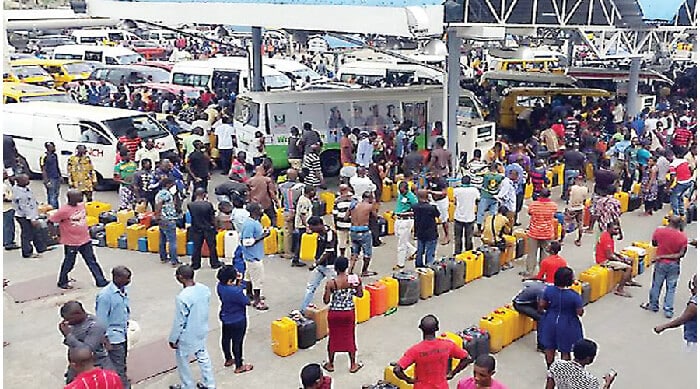
Nigerians are expressing widespread frustration and concern as the price of petrol has surged to an unprecedented ₦855 per liter at Nigeria National Petroleum Company Limited (NNPCL) filling stations, particularly in Lagos.
This sharp increase has exacerbated the ongoing scarcity of the commodity, leaving citizens scrambling for fuel and struggling to cope with the rising cost of living.
The issue has sparked reactions across the country, with many taking to social media to voice their displeasure.
Notably, Nollywood actress and activist, Kate Henshaw, shared a video on her platform, lamenting that her driver discovered the new hike while attempting to purchase fuel.
She highlighted the sudden increase by over ₦200 per liter as particularly alarming.
This current crisis comes several years after the All Progressives Congress (APC), now the ruling party, had criticized the previous administration under President Goodluck Jonathan for setting petrol prices at ₦87 per liter.
Back in January 2015, the APC argued that the price of petrol should not exceed ₦70 per liter, accusing the then-government of exploiting Nigerians by forcing them to subsidize corruption in the oil sector.
The APC’s statement from 2015, released by Lai Mohammed, described the reduction of the petrol price from ₦97 to ₦87 as mere “tokenism” in light of the significant drop in global crude oil prices.
The party argued that even at ₦87 per liter, Nigerians were overpaying for petrol, subsidizing inefficiencies and corruption in the oil industry.
Now, nearly a decade later, the reality of petrol prices exceeding ₦800 per liter is causing widespread distress, with many citizens questioning the government’s handling of the oil sector and its impact on the economy.
APC at the time stated, “When crude oil was selling at 100 dollars per barrel, the landing cost of PMS without subsidy was 125 Naira per litre. Now that the oil price has crash to about 44 dollars per barrel, landing cost without subsidy is about 65 Naira per litre. The same goes for diesel which should not sell for more than 90 Naira per litre.
“While governments of countries which are not as economically endowed as Nigeria have reduced the pump price of fuel as far back as early January 2015, Nigeria that is the world’s sixth largest producer of oil is just announcing a price slash that is far below those countries.
“Early this year, Zambia slashed the price of petrol by 23 per cent while Tanzania reduced the pump price of the product by 16%. In the US, which until recently was importing crude oil from Nigeria, the price of fuel has fallen for 113 consecutive days as of January 16. Therefore, the 10.3% price slash in Nigeria is too meagre too late.”
Fast forward to 2024, petrol sells for over ₦1000 in some states currently due to scarcity.


